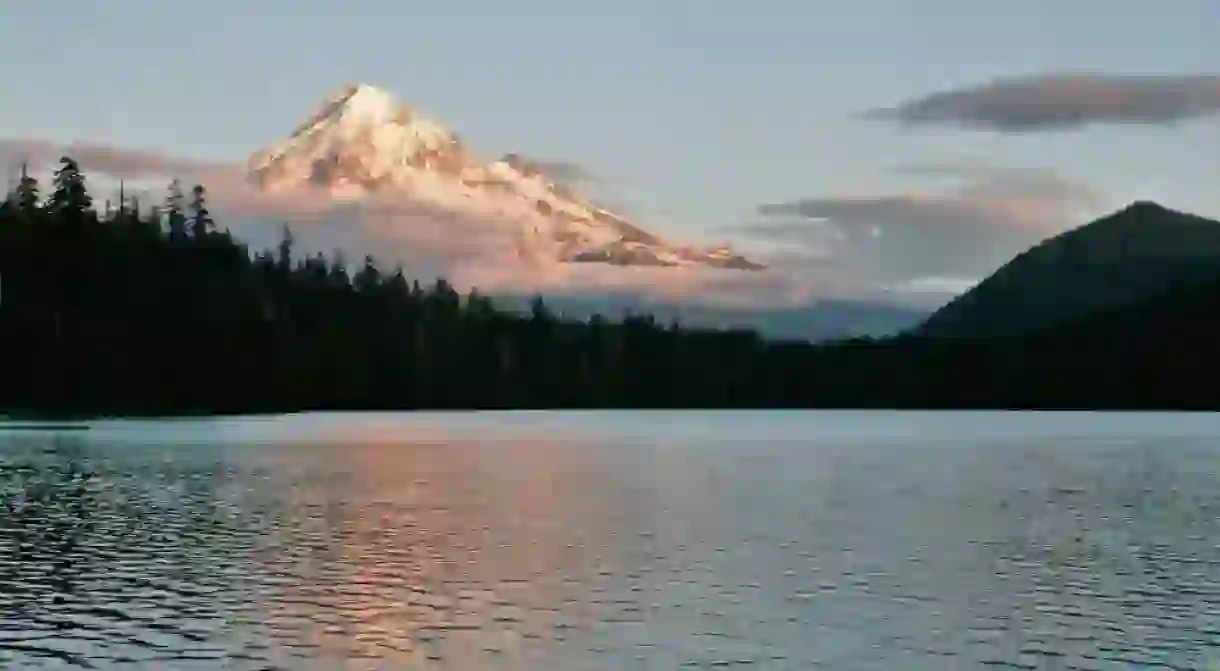The 15 Most Unusual Experiences in Oregon

Oregon is known for its oddities—there’s a reason why its largest city’s motto is “Keep Portland Weird.” Here are the 12 most unusual experiences in Oregon.
There are breathtaking natural wonders and peculiar attractions that some locals don’t even know about, and there are even more interesting gems that have become a source of pride for the Beaver State, including the country’s deepest lake and largest independent book store, and the world’s smallest park.
Get lost in the largest independent book store in the world
Bookstore, Park, Store

Spend the night in a treehouse
Bed and Breakfast, Treehouse

Relive fairy tales at a theme park tucked away in the woods
Amusement Park
Explore a ghost ship
Ruins

On October 25, 1906, the Peter Iredale ran ashore on the Oregon Coast, en route to the Columbia River. The crew abandoned the four-masted steel barque sailing vessel on Clatsop Spit near Fort Stevens in Warrenton, about four miles south of the Columbia River channel. Now visitors can get up close and personal with the shipwreck at low tide. The ship’s over 100-year-old remains jut out of the sand in Fort Stevens State Park.
Visit a lake that disappears in the summer
Natural Feature

Near Sisters in the heart of the Cascade Mountains is a mysterious lake that seems to disappear every summer. If you visit in the winter, you’ll see the Lost Lake in its 79-acre watery splendor; however, by spring, when the streams and creeks slow to a trickle, the mountain basin’s contents begin to drain into a hole. By summer, what was once a bountiful lake mere months ago transforms into a grassy meadow. Geologists believe this phenomenon is caused by a collapsed lava tube created during a period of intense volcanic activity over 12,000 years ago.
Check out some truly bizarre art
Art Gallery, Shop

The Freakybuttrue Peculiarium is the epitome of “Keep Portland Weird.” The shop and art space was established in 1967 by local explorer Conrad Talmadge Elwood, and his love for all things bizarre has become one of the city’s strangest hidden gems. The Peculiarium offers exhibits like a nightmare dollhouse, alien autopsy, and a trip inside a zombie’s brain. In the gift shop, visitors are greeted by a Bigfoot statue and can sift through pop artifacts, gag toys, and freaky specimens. Photography is encouraged, so make sure to bring your camera (or, more realistically, phone) to document your surely one-of-a-kind experience.
Columbia River Gorge
Park

Recommended by Anna Kramer
Defy gravity in a tilted house
Building

In the early 20th century, a small mining company office building began slipping down the hill before its foundation came to rest at an odd angle. The owners claim the structure originally began to slide due to a magnetic force, or “vortex.” They claim this force causes other paranormal phenomena to happen, such as balls rolling uphill and brooms standing on end. Though the vortex theory is just that—a theory—what really happens at the tilted house is a distorted sense of perception, which makes objects appear to change size and do all other kinds of bizarre things. Whatever the cause of its perceptive trickery, the Oregon Vortex is a fun, secret treasure of Central Oregon.
Visit the smallest park in the world
Park

Dick Fagan was an eccentric man. In 1946, he returned from World War II and resumed his journalism career with the Oregon Journal. From his window, he could see an unused hole in a median on Front Street (now Naito Parkway) that was supposed to house a light post that never arrived. As the hole began to collect weeds, he decided to plant flowers in it. He billed the two-foot-wide plot “The Smallest Park in the World” and dedicated it on St. Patrick’s Day in 1948. In 1971, The Guinness World Records legitimized the claim by dubbing Mill Ends Park the smallest city park in the world. Though Fagan passed away in 1969, the park is still maintained and open to the public—if you even notice it on your waterfront stroll.
Hang out with some dinosaurs
Park

Nestled off highway 101 sits Oregon’s very own Jurassic Park. Prehistoric Gardens was established in 1955 and offers weary road trippers a reprieve (and excuse to gawk at size-accurate dinosaur sculptures). The attraction’s late creator, Ernest Nelson, constructed 23 concrete reptiles in a 30-year span, with his most impressive being a Brachiosaurus, which measures 86 feet long and 46 feet tall. The dinos are scattered along a foliage-lined coastal trail that truly makes visitors feel like they’ve just stepped through a time machine.
Take an eerie hike
Ruins

What used to be a park ranger station and bathrooms for hikers has become a moss-covered, dilapidated secret in Portland. Aptly nicknamed the Witch’s Castle, the stone structure built in the 1930s suffered severe damage in 1962 and was left to rot in the woods of Macleay Park. An easy half-mile walk from the Upper Macleay Parking lot near the Portland Audubon Society, or a three-quarter mile hike from the Lower Macleay Parking lot at at NW 30th and Upshur is all it takes to transport yourself into an enchanting, semi-creepy fairytale.
Dig for fossils
Park

Swim in the deepest lake in the U.S.
Natural Feature

Take in the views at Mount Tabor
Drink like a local
Bar













